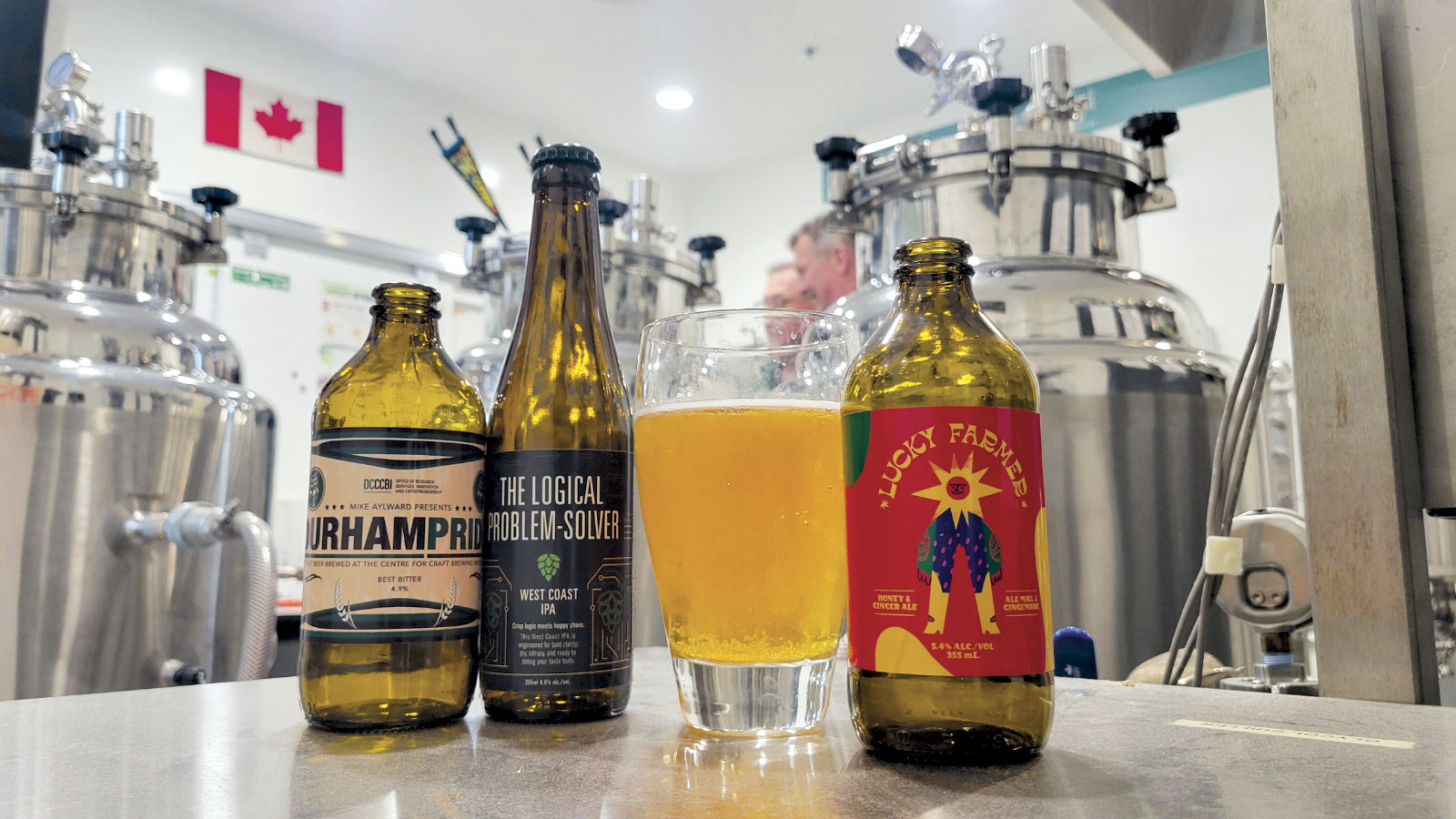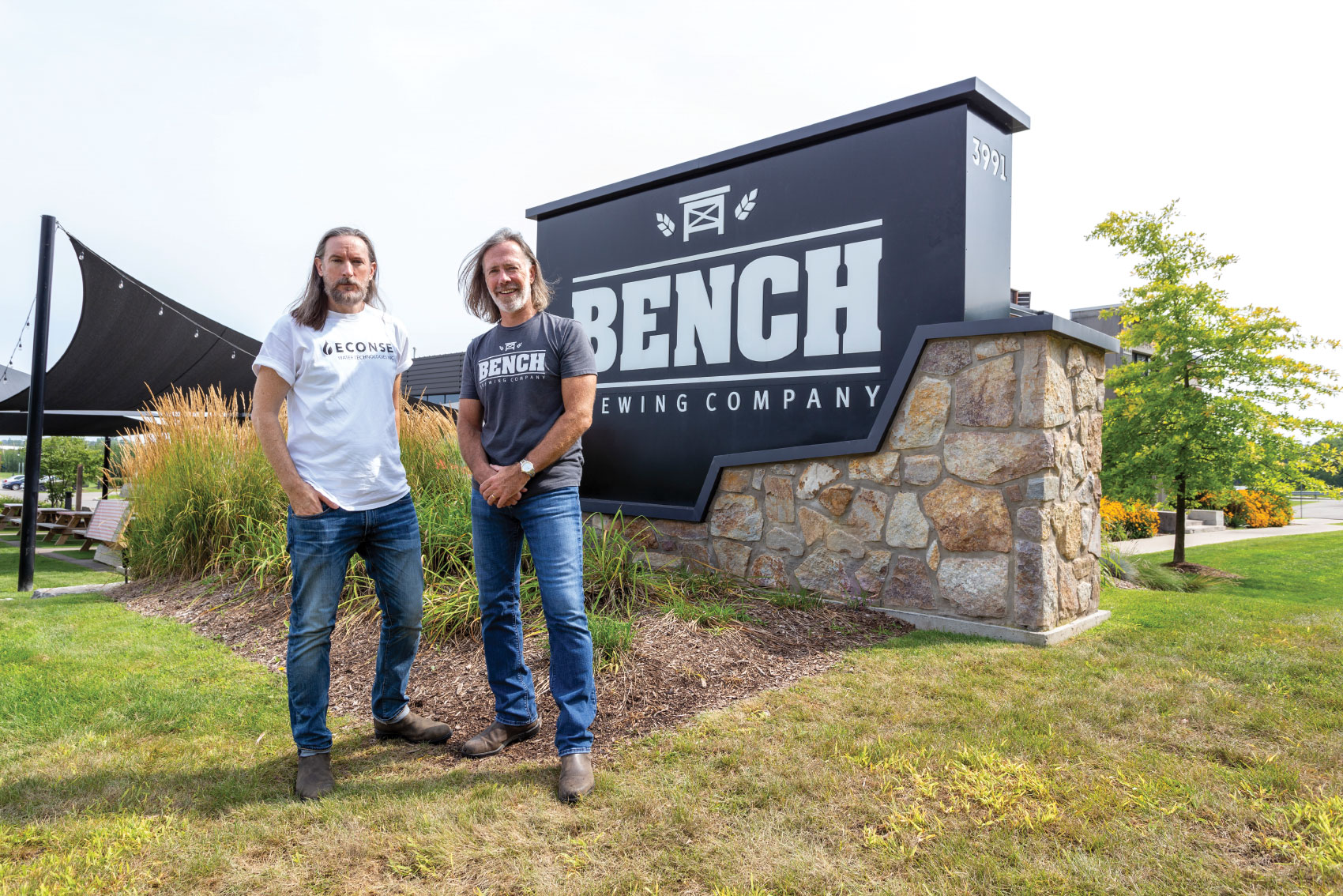A southern Ontario college is playing a quiet, but significant role in shaping the future of craft brewing and other fermented beverages. Durham College’s Whitby campus is home to the Centre for Craft Beverage Innovation (CCBI).
The Centre collaborates with both established and novice craft beer, hard cider, kombucha and seltzer makers on everything from formulating new recipes to testing the new ingredients and production methods.
The CCBI was established in 2014 thanks to a grant from the Natural Sciences and Engineering Research Council of Canada. Since then, it has worked with dozens of beverage makers in southern Ontario and other parts of the country to develop new products, production tools and testing methods. Robin Young, the College’s director of business development and corporate training, says the CCBI’s purpose is two-fold. First and foremost, it’s there to share its technical knowledge with beverage makers. Secondly, it aims to share its entrepreneurial expertise to help industry partners turn technical innovation into business success.
One of the things that sets the CCBI apart from similar research centres is the fact that its home to a state-of-the-art testing lab and facility. That includes a commercial-grade pilot line, or “baby” brewing line, that features 100-litre hot liquor tanks, a 50-litre mash and lauter tun to release malt sugars and two 100-litre conical fermenters. It’s also home to an Anton Paar finished beer analysis system that provides real-time data on alcohol content, extract levels, carbon dioxide and other quality characteristics.
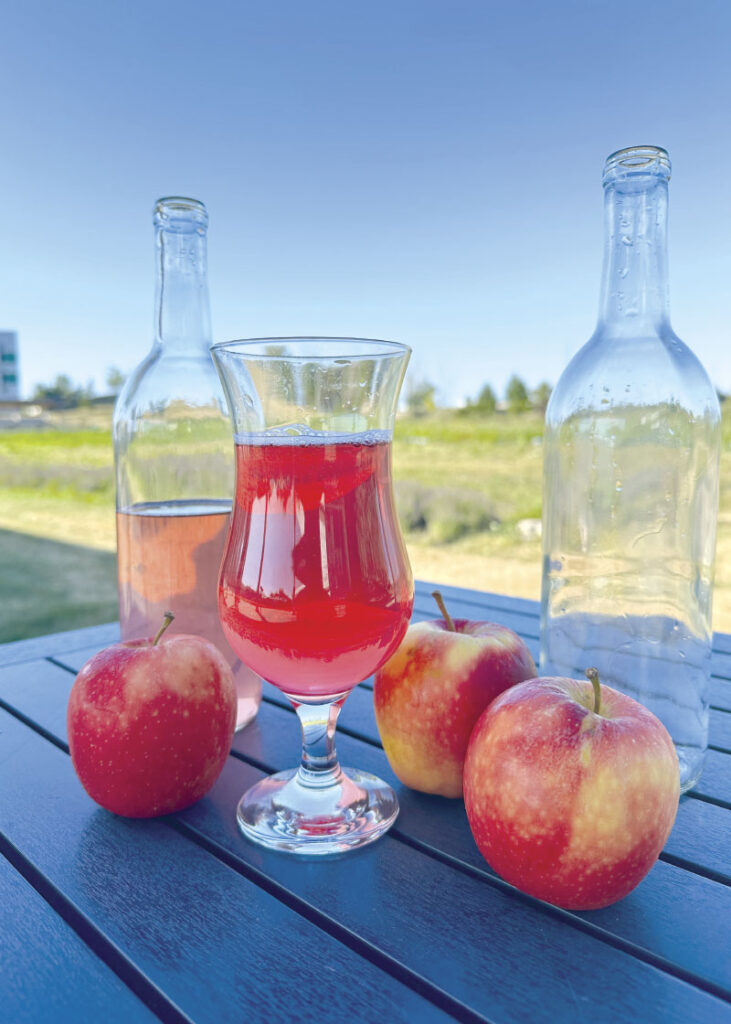
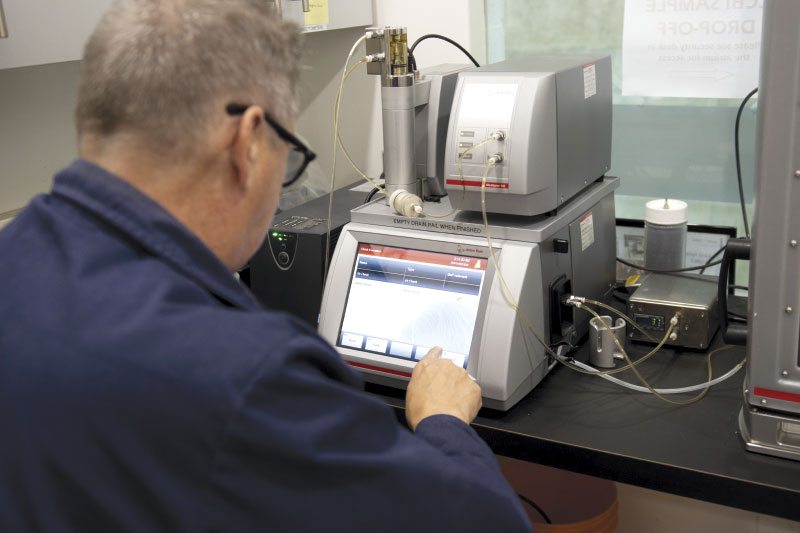
“We have a lab [that] I would say is arguably one of the best or among the best finished beer or beverage labs in Canada. We have full analytical and micro capability,” said Chris Gillis, the College’s manager of applied research business development, who helped found the Centre.
In addition to housing some of the latest in beverage making and testing technology, the CCBI also has a wealth of brewing expertise. Its brewing expert has more than 35 years of experience in the industry, while its fermentation expert is a doctor of philosophy on the subject and worked for decades with one of North America’s largest brewing companies. Gillis says the Centre works with between six and 12 industry partners in a typical year. Some are repeat customers looking to develop a new product on a large scale and want to produce a new batch or two every month. Others are newcomers to the business looking to develop a new recipe or test the impact of a new ingredient in a seltzer or kombucha on a one-time basis.
One of the CCBI’s most notable collaborations was with Partake Brewing, one of the first non-alcoholic craft brewers in Canada. Launched in 2017, Partake’s products are now available at major retailers in both Canada and the U.S., and they have won multiple brewing awards including multiple World Beer Awards. While he can’t share details of CCBI’s work with Partake, Gillis says the Centre “hit it out of the park” with that early collaboration.
“What I think is super important about that [collaboration] is it really identifies the value that colleges can bring to Canadian industry when you look at what [Partake] has done,” he said. “They’ve done a spectacular job to go from being on Dragon’s Den in 2015, barely a start-up, to basically going to nationwide distribution. They’ve really owned that category.”
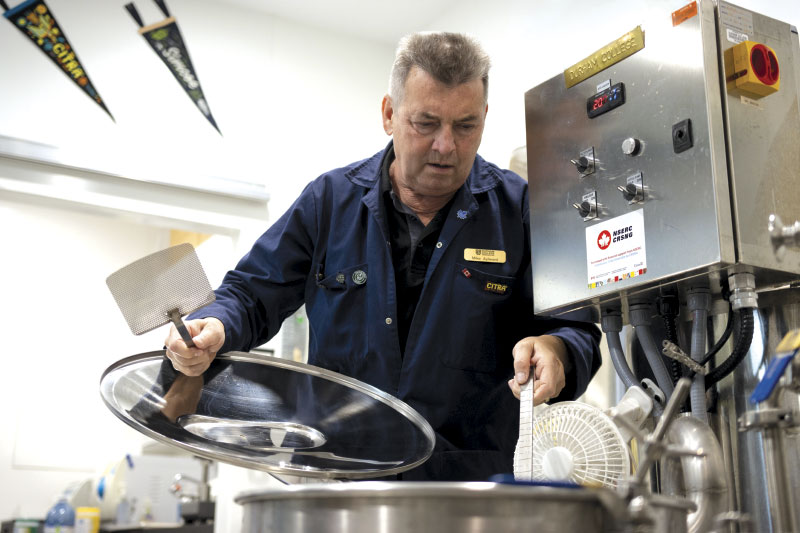
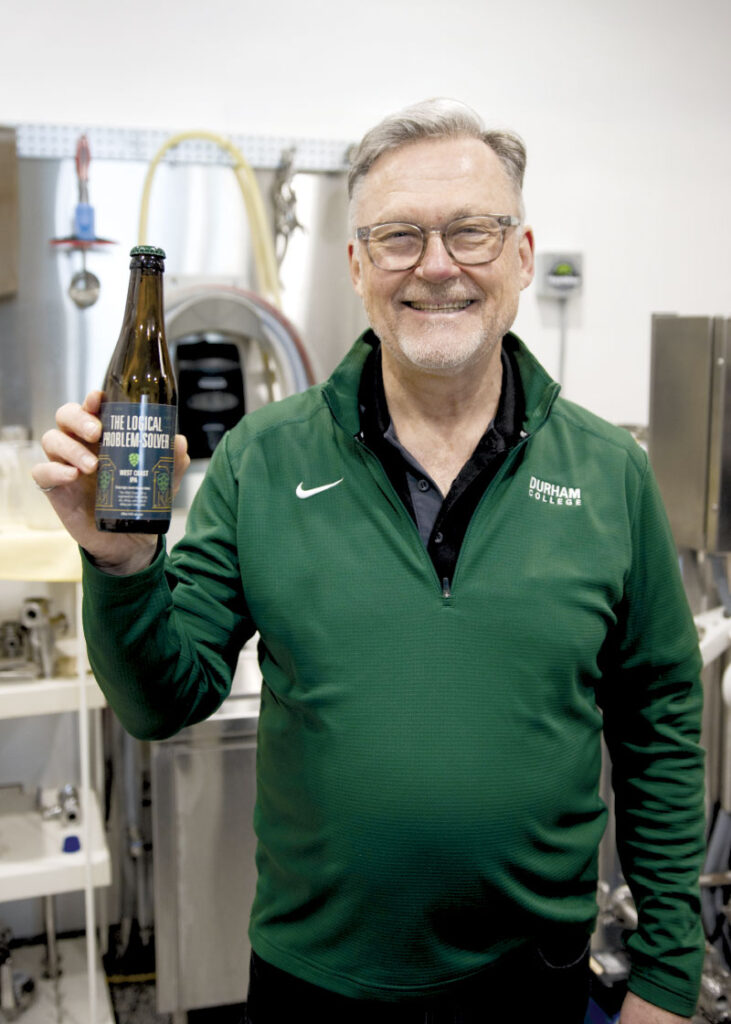
The CCBI also partnered with Ontario Craft Brewers (OCB) and the Ontario Hop Growers Association as part of an Ontario hop terroir research project. The aim of the project was to analyze hops from different parts of Ontario to determine if where they were grown impacted their flavour profile and, if so, how that flowed into a finished beer. Gillis says the Centre was pleased with the results of the project, even though research ground to a halt during the COVID-19 pandemic.
The Centre is currently working on another collaboration with the OCB which is focused on the roll out of a quality management system designed specifically for the craft brewing industry. Once it’s rolled out in Ontario, it’s expected the implementation system will be shared with other provinces, including Alberta and New Brunswick, both of which participated in the development. Gillis and Young both say the Centre’s collaborations with industry partners can be something of a balancing act. While its research work is important, the CCBI must also focus on developing solutions that help address the everyday challenges its partners face.
“We really focus on what the client’s needs are,” Gillis said. “We look at it as industrial problem solving. Fundamentally, it’s about the challenge our client company is having. Is it technical? Is it training? It’s really about trying to be outwardly focused on what the customer’s needs are and striking a balance.”
“We design everything with our partners, not for our partners,” Young said. “Whether it’s product trials or skills programming, you’re starting with the challenge and you’re working backwards from there together. That’s why everything the CCBI does is so relevant … it’s grounded in what the local businesses actually need.”
We design everything with our partners, not for our partners. Whether it’s product trials or skills programming, you’re starting with the challenge and you’re working backwards from there together. That’s why everything the CCBI does is so relevant … it’s grounded in what the local businesses actually need.
Robin Young, Centre for Craft Beverage Innovation
Even though the CCBI is located on a college campus, it’s not a brewing school per se. Most of the people who work at the Centre are paid staff. However, a handful of Durham students from a number of different faculties do take part in the Centre’s projects each year. Those students receive instructions on lab protocols and how to conduct proper testing. The aim is to provide them with hands-on experience so they can learn to interpret test results. That includes helping develop new recipes, and conducting testing and interpreting the results for industry partners.
While the number of students who take part in the CCBI’s efforts each year is relatively small, many move on to careers in the brewing industry. In one recent class, one student moved on to a full-time job with contract brewer Brunswick Bierworks in Toronto, another landed a gig with Equals Brewing Company in London, Ont., and a third was hired by Molson Coors to work at its brewing lab in Chilliwack, B.C.
“We’ve actually been pretty successful in that regard,” Gillis said. “They all [moved on] because of the hands-on experience they gained here and the equipment that they were able to use, and the understanding that they gained on what the results mean with respect to the process.”
It’s no secret the craft brewing industry has struggled of late. Razor-thin margins and increased production costs have forced some brewers to shut their doors. However, Gillis remains bullish about the industry’s future. One reason for his optimism is the increasing interest in low-alcohol beers and seltzers. Not only is it another market for brewers to tap, it’s also a great way for them to help reduce their production costs.
“If you take one of your really popular beverages that’s maybe five or 5.2 ABV and you cut it in half, lots of times you don’t lose very much in the way of mouth feel or taste that you might see in the [non-alcohols],” he said.
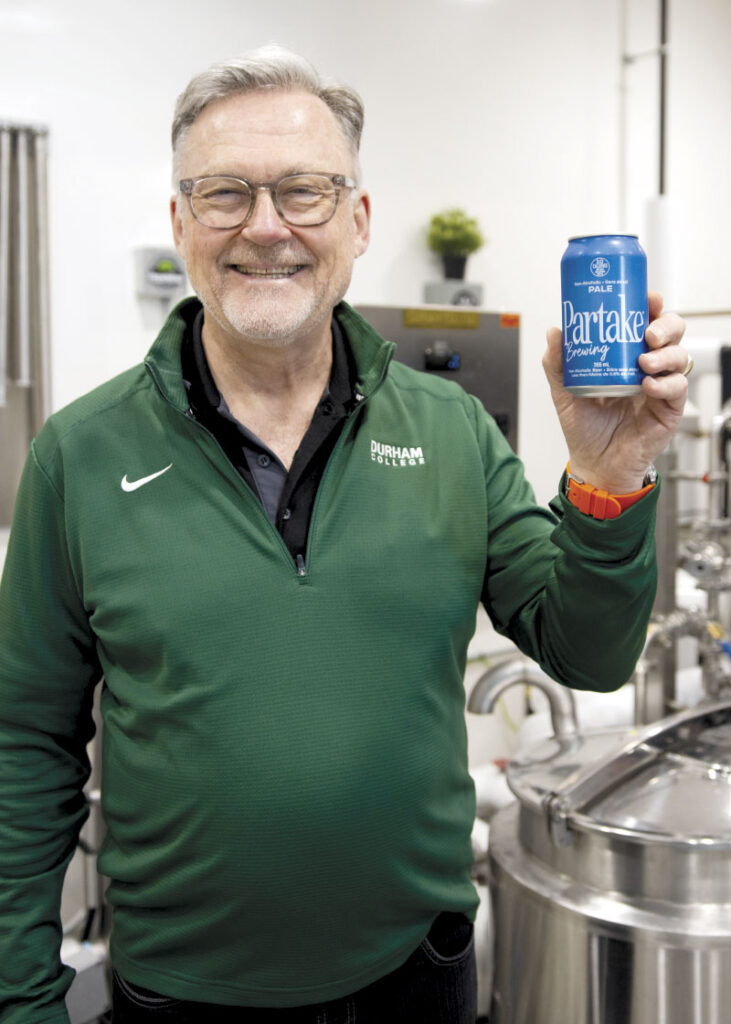
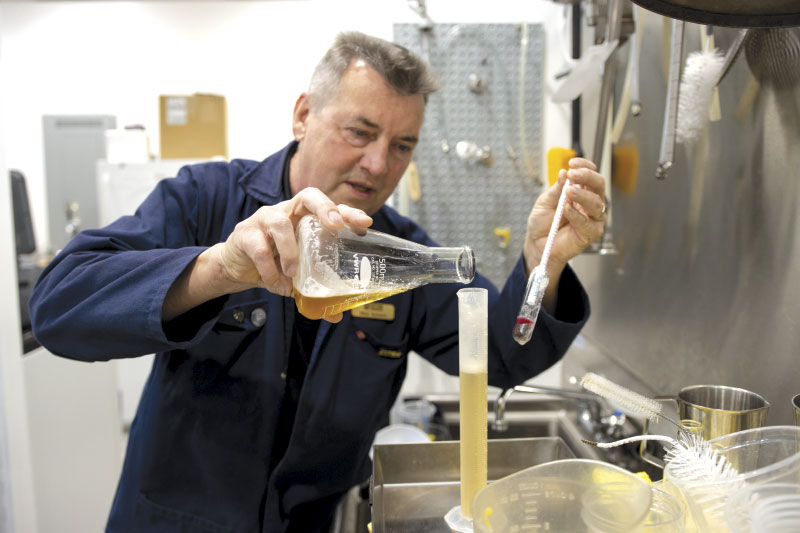
Young says the CCBI will continue to work closely with the College’s corporate services division to provide more training and consulting opportunities for business partners. Those opportunities will likely include a focus on corporate team development, improving production processes and guidance on how companies can remain competitive. Formerly known as the Centre for Craft Brewing Innovation, the CCBI was rebranded this past spring to better reflect the fact that its focus has expanded to include a wider range of beverages.
Gillis says the Centre will continue to investigate new products and production techniques. It recently partnered with the school’s AI hub to develop a new beer recipe that factored in several considerations, including water treatment. “It was quite instructive to go through that and see how [AI] works. And it turned out to be a pretty good beer,” he said.
Gillis is excited about the latest addition to the CCBI’s technology lineup. It recently purchased a second Anton Paar system known as the Animo 3100. It’s essentially a lab on wheels that looks like a cross between a lab cart and a shopping cart. The beauty of the machine is that it can be taken anywhere and can produce test results on the spot in a few moments.
“I think it’s going to be super interesting and beneficial. One of the tricky things for operations right now is if you’re trying to dial in your process controls at various stages, you have to take samples at the line and then take them into a lab … [and] there’s a time delay. With this piece of equipment, you can actually hook it up to an input or output line … and you get live, real-time results of ABV, carbon dioxide, oxygen, etc.,” said Gillis.

